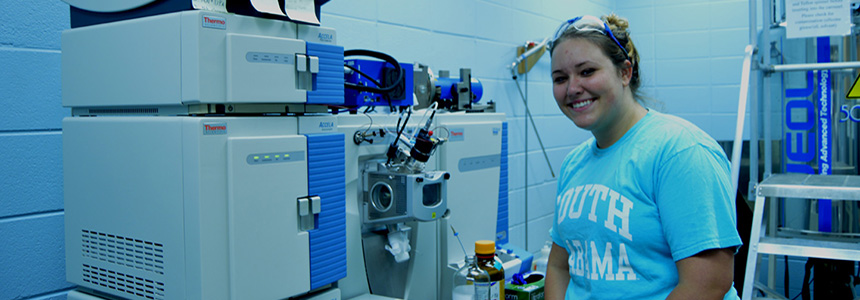Forensic Science Courses

Required Courses
Four core courses (13 credit hours) are required of all Forensic Science minors:
AN 250: Forensic Anthropology
CH 201/L: Organic Chemistry I or CH 265/L: Introductory Analysis
CJ 105: Introduction to Criminal Justice (formerly CJ 205)
CJ 223: Introduction to Forensic Science (formerly CJ 423)
Minors must also select two of the following upper division courses (6 credit hours)*:
AN 335: Field Work in Archaeology
AN 365: Human Osteology in Archaeology and Forensic Science
BLY 302: Genetics
BLY 354: General Entomology
CH 440: Biochemistry I
CH 465/L: Instrumental Analysis
CJ 332: Criminal Law
CJ 360: Theories of Offending
CJ 390: Drugs and Crime
CJ 422: Criminal Investigations
PSY 425: Mental Health and Law
*Students must take at least one upper division course outside of their major discipline.
Course Descriptions
AN 250: Forensic Anthropology
This course will introduce students to the field of forensic anthropology. Specifically,
it will survey the basic methods employed by forensic anthropologists to recover and
analyze human skeletal remains, including the construction of a biological profile
and the analysis of skeletal trauma. No pre-requisites. Offered most spring semesters and some Maymesters.
AN 335: Field Work in Archaeology
Archaeological field and laboratory techniques include excavation, site survey, artifact
processing and analysis. Fee. Pre-requisites: AN 101 or permission of instructor.
AN 365: Human Osteology
This hands-on course focuses on the identification of the bones of the human skeleton
and its application to specialities within biological anthropology, including bioarchaeology
and forensic anthropology. Topics to be covered include human skeletal and dental
anatomy, skeletal growth and development, skeletal pathology and anomalies, and the
biological profile. Pre-requisites: Grade of B or better in AN 121/L or AN 250. Offered every other fall semester.
Back to Top
BLY 302: Genetics
An introduction to both classical and modern genetic concepts and theory, with an
emphasis on problem-solving. Topics covered include Mendelian genetics, molecular
genetics, and evolutionary genetics. Pre-requisites: BLY 121/L, BLY 122/L, and CH 131/L.
BLY 354: General Entomology
Classification and habits of insects, including collection, preservation, and identification
of those occurring in South Alabama. Taught in the fall semester. Pre-requisites: BLY 121/L and BLY 122/L.
CH 201: Organic Chemistry I
Fundamentals of structure and chemical behavior of organic molecules including nomenclature,
properties, structure, stereochemistry, spectroscopy (both infrared and nuclear magnetic
resonance), reactions, synthesis, and mechanisms of alkanes, alkenes, alkyl halides,
and alcohols. (Offered Fall and Spring Semesters). CH 201L must be taken concurrently. Pre-requisite:
CH 116 or CH 132/L. Co-requisite: CH 201L.
CH 201L: Organic Chemistry I Laboratory
Laboratory exercises associated with CH 201. (Offered Fall and Spring Semesters.)
The laboratory introduces basic organic laboratory practices such as the collection
of physical properties data, separation and purification techniques, synthesis, and
spectroscopic methods. Pre-requisite: CH 116 or CH 132/L. Co-requisite: CH 201.
CH 265: Introductory Analysis
A detailed study of the fundamental theories and principles of chemistry with emphasis
on their application to quantitative analysis. (Because proficiency of the material
covered in CH 132 is vital for success in this course, students are strongly advised
to take the two courses as close together as schedules permit. Offered Fall and Spring
Semesters.) Pre-requisites: CH 132/L or CH 141/L. Co-requisite: CH 265L.
CH 265L: Introductory Analysis Laboratory
Laboratory exercises associated with CH 265. (Offered Fall and Spring Semesters.)
Pre-requisites: CH 132/L or CH 141/L. Co-requisite: CH 265.
CH 440: Biochemistry I
Study of fundamental biochemical concepts; emphasis is placed on protein, carbohydrate,
and lipid structures as related to their functional behavior; enzyme kinetics and
mechanisms of action; thermodynamic relationships in biochemical systems. (Offered
Fall Semester.) Cross-listed with BLY 440. Pre-requisite: CH 202.
CH 465: Instrumental Analysis
Modern analytical instruments, their operating principles, and their applications.
(Offered Fall Semester.) Pre-requisites: CH 265/L and CH 301/L or CH 302/L. Co-requisite: CH 465L.
CH 465L: Instrumental Analysis Laboratory
Laboratory exercises associated with CH 465. (Offered Fall Semester.) Pre-requisites: CH 265/L; and CH 301/L or CH 302/L. Co-requisite: CH 465.
CJ 105: Introduction to Criminal Justice
A review of the system for the delivery of Criminal Justice services in the U.S. and
an analysis of operational practices at the major criminal justice decision stages.
No pre-requisites.
CJ 223: Introduction to Forensic Science
Survey of scientific crime detection methods; crime scene search, identification,
and preservation of evidence; uses of the laboratory for criminal investigation. No pre-requisites.
CJ 332: Criminal Law
A study of the origins and nature of the acts that constitute crimes with a detailed
examination of the elements of certain criminal offense. Pre-requisite: CJ 105.
CJ 360: Theories of Offending
A study of theories of criminal behavior and delinquent behavior. CJ majors must pass
with a "C" or better. Pre-requisite: CJ 105.
CJ 390: Drugs and Crime
Special topics in Criminal Justice. A close look at the relationship between drugs
and crime in America. Pre-requisite: CJ 105.
CJ 422: Criminal Investigations
Explores criminal investigation procedures including theory of investigation, case
presentation, interrogation, and special problems in criminal investigation. Pre-requisite: CJ 105.
PSY 425: Mental Health and Law
Selected topics in psychology and criminal Justice. An overview of the relevant federal and state laws, federal regulations and court rulings which address the issues of justice for preserving the rights of individuals with mental illness. Pre-requisite: PSY 120 or PSY 121
